Related Research Articles

Louis II was Prince of Monaco from 26 June 1922 to 9 May 1949. A maternal third cousin of Princess Alice of Battenberg, the mother in law of Queen Elizabeth II.
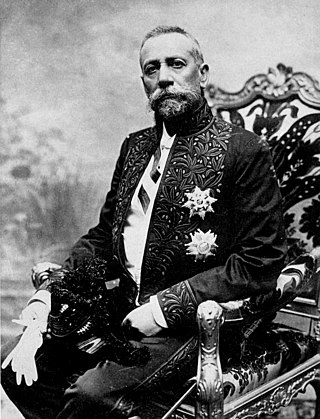
Albert I was Prince of Monaco from 10 September 1889 until his death. He devoted much of his life to oceanography, exploration and science. Alongside his expeditions, Albert I made reforms on political, economic and social levels, bestowing a constitution on the principality in 1911.

A ménage à trois is a domestic arrangement and committed relationship with three people in polyamorous romantic or sexual relations with each other, and often dwelling together; typically a traditional marriage between a man and woman along with another individual. The phrase is a loan from French meaning "household of three". Contemporary arrangements are sometimes identified as a throuple, thruple, or triad.
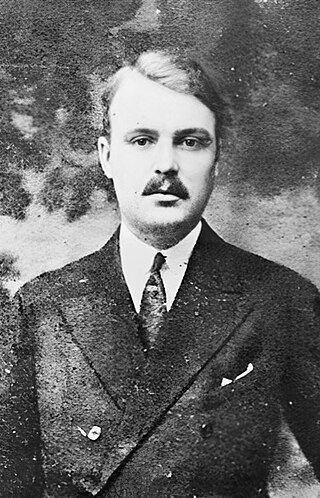
Prince Pierre of Monaco, Duke of Valentinois was the father of Rainier III of Monaco. He was a promoter of art, music, and literature in Monaco and served as the head of the country's delegation to the United Nations Educational, Scientific, and Cultural Organization (UNESCO) and to the International Olympic Committee.
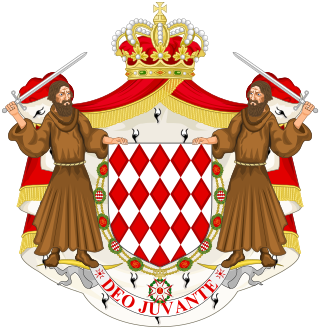
The House of Grimaldi is the current reigning house of the Principality of Monaco. The house was founded in 1160 by Grimaldo Canella in Genoa and became the ruling house of Monaco when Francesco Grimaldi captured Monaco in 1297. The House of Grimaldi has produced every Prince of Monaco. During much of the Ancien Régime, the family resided in the French court, where from 1642 to 1715 they used the title of Duke of Valentinois.

Leonor Fini was an Argentinian-born Italian surrealist painter, designer, illustrator, and author, known for her depictions of powerful and erotic women.

Carlo Carrà was an Italian painter and a leading figure of the Futurist movement that flourished in Italy during the beginning of the 20th century. In addition to his many paintings, he wrote a number of books concerning art. He taught for many years in the city of Milan.

Campagna is a small town and comune of the province of Salerno, in the Campania region of Southern Italy. Its population is 17,148. Its old Latin name was Civitas Campaniae. Campagna is located in one of the valleys of the Picentini Mountains, at an altitude of 270 meters above sea level.

Count Carlo Sforza was an Italian diplomat and anti-fascist politician.
The Monaco succession crisis of 1918 arose because France objected to the prospect of a German national inheriting the throne of the Principality of Monaco. Prince Albert I had only one legitimate child, the Hereditary Prince Louis, then heir apparent to the principality. As World War I drew to a close, Prince Louis, at the age of forty-eight, remained (legally) childless, unmarried, and unbetrothed.
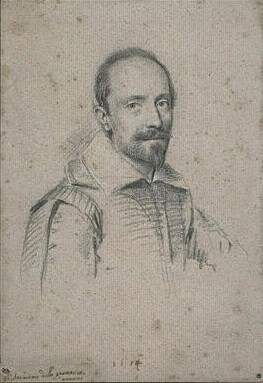
Antiveduto Grammatica was a proto-Baroque Italian painter, active near Rome.

The House of Ruspoli is historically one of the great aristocratic families of Rome, but is originally from Florence. Following World War II and the fall of Fascism, the newly established Italian Republic officially abolished titles and hereditary honours in its 1946 Constitution, with the exception of the papal nobility of Rome, as those titles had been created by papal authority.
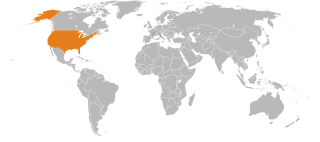
Monaco and the United States exchanged consular officials soon after the end of the U.S. Civil War. The first consul from Monaco to the US was Louis Borg, who presented his credentials in May 1866.
Hassan Aziz Hassan was an Egyptian prince. He was one of the last surviving members of the Muhammad Ali Dynasty. He held the title of "El-Nabil", which was also his name at birth. Having been educated in Beirut and England at Leighton Park School, he was a painter and pianist, and was a student and close friend of the expatriate Polish concert pianist Ignaz Tiegerman and of the artists Fabrizio Clerici and Leonor Fini who portrayed it.

Jorge Lavelli is a French theater and opera director of Italian ethnicity and Argentine origin. The son of Italian immigrants in Argentina, Lavelli has lived in France since the early 1960s. He became a French citizen in 1977.
Konstanty Aleksander Jeleński was a Polish essayist.

Fabrizio Clerici was an Italian painter.
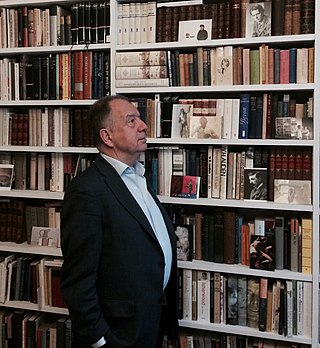
Wojciech Karpiński was a Polish writer, historian of ideas and literary critic.
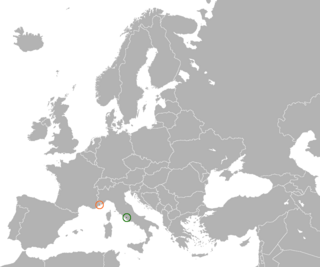
Holy See–Monaco relations are bilateral relations between the Principality of Monaco and the Holy See. The principal Monégasque official is Ambassador Claude Giordan, who officially started at his position in November 2015. The Holy See is represented by its Apostolic Nuncio, Archbishop Antonio Arcari, who assumed office on May 25, 2019. The Embassy of Monaco to the Holy See is located in Rome, on Largo Spinelli. The Apostolic Nunciature to Monaco is non-residing as the nuncio currently resides in Rome.
The invasion and occupation of Monaco refers to the presence of Italian and German forces between 1940 and 1944 on the territory of the Principality of Monaco and the control they exerted within the territory.
References
- ↑ Pettibone, Charles D. (2010). The Organization and Order of Battle of Militaries in World War II: VOLUME VI ITALY and FRANCE Including the Neutral Countries of San Marino, Vatican. Trafford Publishing. p. 514. ISBN 9781426946332 . Retrieved 20 January 2018.
- ↑ Natalini, Fabrizio (2015). Leonor Fini e la torre del surreale. Sinestesie Online. ISSN 2280-6849.
- ↑ Dan, Maria Masau; Strukelj, Vanja (25 June 2014). Leonor Fini. Giunti. p. 16. ISBN 9788809801479 . Retrieved 20 January 2018.
- ↑ Webb, Peter (2009). Sphinx: The Life and Art of Leonor Fini. p. 88,98.
- ↑ Aleksandra Klich, Kot, Kot, nie odchodź. Wysokie Obcasy Extra nr. 2(11)/2012, pp.62-68 (in Polish)
- ↑ "Lèpri, Stanislao". Treccani. Retrieved 20 January 2018.
- ↑ Testa, Alberto (2005). Storia della danza e del balletto. Gremese Editore. p. 44. ISBN 9788884403926 . Retrieved 20 January 2018.